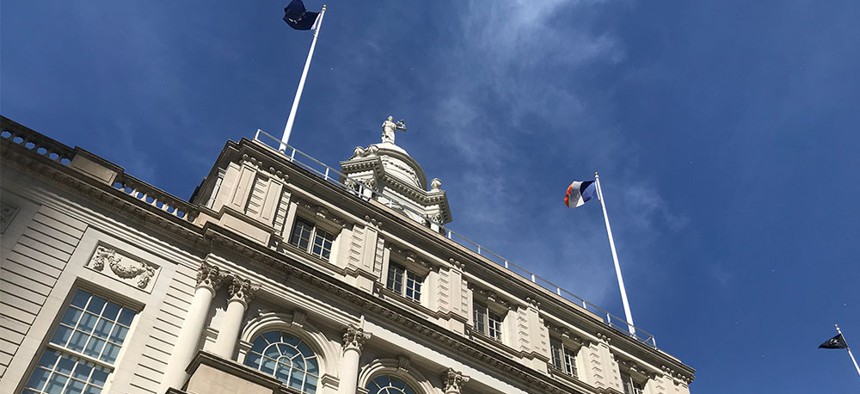Robin Hood gets in on NYC budget debate

New York City Hall Zach Williams
More than 200 people gathered Thursday for the 2019 NYN Media OpCon. The daylong event celebrated and examined what it takes to run a nonprofit. This includes how to streamline processes, accounting, real estate issues, and how to make leadership work for a nonprofit. This Twitter moment includes highlights:
Same situation @JCCANY. Thanks @iamwesmoore for drawing attention to the City’s failure to pay nonprofits for the work we do to keep NYC healthy, safe & secure. Our workforce and our businesses earn equitable treatment. Consider city salaries and city fringe! https://t.co/B988gZ9nbO
— Judge Ron Richter (@RichterJCCACEO) June 13, 2019
The Andrew W. Mellon Foundation has announced $3.3 million in new grants for prison education and reentry programs. The money will support four programs across the country, according to a June 13 press release. “Mass incarceration is linked to mass undereducation, but innovative, proven interventions can address both crises,” said Mellon Foundation President Elizabeth Alexander. Here is who is receiving the grants:
- John Jay College of Criminal Justice got a grant to support the expansion of educational and reentry initiatives for students incarcerated at Otisville Correctional Facility in Orange County.
- Marymount Manhattan College will use a grant to support degree-granting programs at the Bedford Hills Correctional Facility for Women and to expand to Taconic Correctional Facilities for Women.
- California State University, Los Angeles will use the money to support a BA program for incarcerated students at Lancaster State Prison.
- The Alliance for Higher Education in Prison will use a grant to support a national prison education network that gathers, analyzes, and shares data, research, pedagogical practices, and training.
Robin Hood CEO Wes Moore has something to say about the New York City budget process. Moore wants Mayor Bill de Blasio to support $106 million in funding to close the gap between what the city pays human services nonprofits for the services they provide on the city’s behalf, and what those services actually cost the nonprofits to provide. At the same time, Moore and nonprofit advocates want funding for “pay equity” in early childhood education.
“The City Council must stand its ground,” Moore said in a June 13 statement. “Allowing the mayor to pit the pay equity needs of underpaid and overworked early child providers against the broader human services sector is a false choice and a callous bargain. It undermines the vision of an equitable city. The era of forcing these organizations that provide vital services for the most vulnerable New Yorkers to beg and borrow for every dollar they’ve earned must end now.”
Same situation @JCCANY. Thanks @iamwesmoore for drawing attention to the City’s failure to pay nonprofits for the work we do to keep NYC healthy, safe & secure. Our workforce and our businesses earn equitable treatment. Consider city salaries and city fringe! https://t.co/B988gZ9nbO
— Judge Ron Richter (@RichterJCCACEO) June 13, 2019
Jewish Child Care Association of New York has received a $4.1 million contract from the New York City Administration for Children’s Services. The money will fund specialized preventive services for teens, according to the City Record. The Children’s Aid Society will provide wrap-around services on behalf of the agency, per a $140,000 contract.
The city Department of Health and Mental Hygiene has awarded a $1.89 million contract to Community Health Action Of Staten Island, which will provide a nonfatal overdose management program. The Young Adult Institute will provide $301,869 worth of socialization services for people with autism.
Bloomberg Philanthropies has released its 2019 report. The annual update from the mega-philanthropy includes the latest on its program areas: arts, education, environment, government innovation, and public health. This includes the $500 million Beyond Carbon campaign to promote renewable energy, as well as the Everytown for Gun Safety and Moms Demand Action.
“Every day, the window for avoiding the worst impacts of climate change grows smaller,” founder Michael Bloomberg said in a statement. “More Americans lose loved ones to opioid overdoses and gun violence. More students miss out on a good education and the opportunity to go to college. And communities that were once home to thriving industries slip further behind in the changing economy. Proposing ideas for 2021 isn’t good enough. We need to get things done in the here and now, and I’m lucky enough to be in a position to help that.”
Here are a few highlights of what the philanthropy has been up to, taken more or less verbatim from the press release.
- A $1.8 billion gift went to Johns Hopkins University last year for student financial aid programs.
- Nearly 500 U.S. cultural organizations have benefitted from the philanthropy’s management training since 2015.
- About 120 mayors and 240 senior staff members have provided executive leadership training through the Bloomberg Harvard City Leadership Initiative.
- Bloomberg Associates has worked on 314 projects across 14 cities globally since 2014
- More than 161,000 hours were volunteered by Bloomberg employees in 2018.
NEXT STORY: A nonprofit lands two new board members
